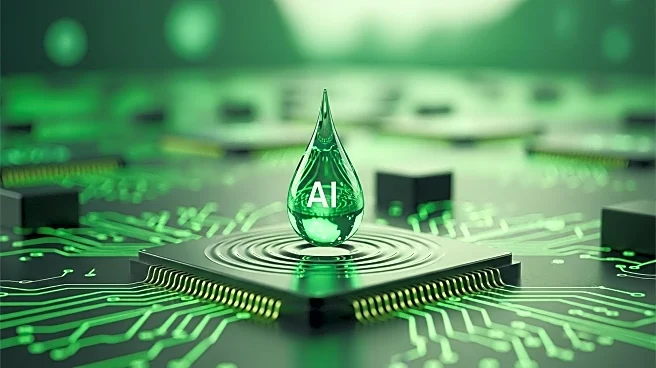What's Happening?
Artificial intelligence systems, such as OpenAI's ChatGPT, are reported to consume significant amounts of water during operations. Each short conversation with the GPT-3 version of ChatGPT uses approximately 500 milliliters of water, equivalent to a single-serving water bottle. This water usage includes cooling data center servers and the power plants generating electricity for these operations. The water demand varies based on location and timing, with cooler, humid regions requiring less water for cooling compared to hot, dry areas. New cooling technologies, such as immersion cooling and Microsoft's zero-water cooling design, offer potential solutions to reduce water consumption, though they are not yet widely adopted due to cost and complexity.
Why It's Important?
The water consumption of AI systems has significant implications for environmental sustainability, particularly in regions facing water scarcity. As AI technology continues to expand, understanding and mitigating its environmental footprint becomes crucial. Companies and policymakers need to balance innovation with sustainability, ensuring that AI advancements do not exacerbate existing water shortages. Transparency in reporting water usage can help stakeholders make informed decisions and promote the adoption of more efficient technologies. The broader impact includes potential changes in public policy and industry practices to address the environmental costs associated with AI operations.
What's Next?
Future developments may include increased adoption of water-efficient cooling technologies and strategic placement of data centers in regions with favorable climates. Companies might also invest in research to further reduce the water footprint of AI systems. Policymakers could implement regulations to encourage sustainable practices in the tech industry. Additionally, public awareness campaigns may highlight the importance of responsible water usage in AI operations, potentially influencing consumer choices and corporate strategies.
Beyond the Headlines
The hidden water cost of AI systems raises ethical questions about resource allocation and environmental responsibility. As AI becomes more integrated into daily life, the need for sustainable practices grows. This development could lead to long-term shifts in how technology companies approach environmental stewardship, potentially influencing global standards for resource management in tech industries.









